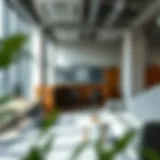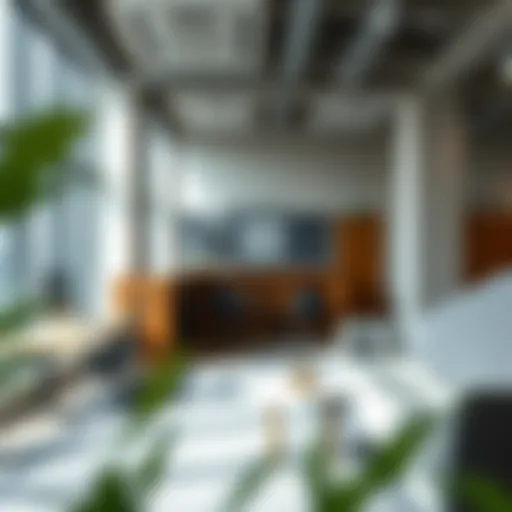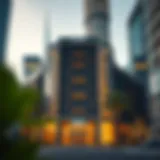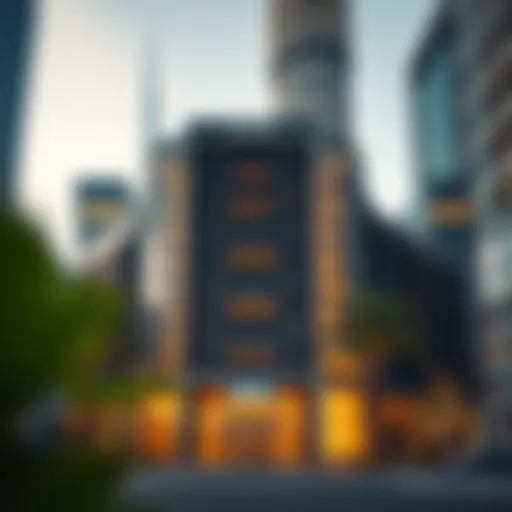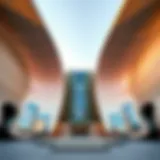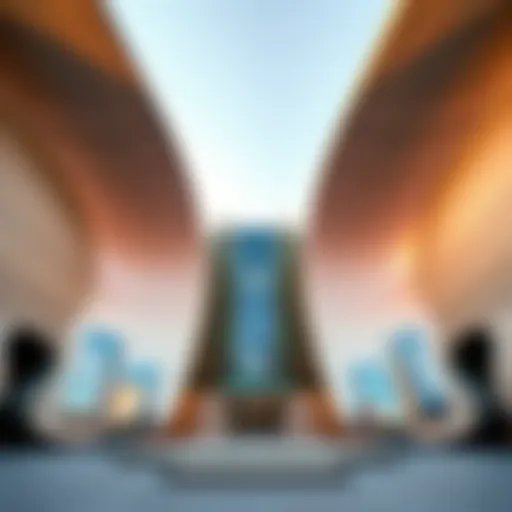Industrial Glass in Dubai: Market Trends and Insights


Intro
Dubai is a city synonymous with luxury and innovation, where the skyline is a testament to architectural daring and technological prowess. Within this vibrant context, industrial glass plays a crucial role. This segment of the real estate industry is often overlooked, but it is integral to both construction and manufacturing sectors. The significance of industrial glass is multidimensional, spanning aesthetics, functionality, and energy efficiency.
In recent years, the demand for industrial glass in Dubai has surged, corresponding with the rapid growth in the real estate market. New constructions, renovations, and expansions all contribute to a persistent need for glass products tailored for industrial usage. As we navigate through the various dimensions of this market, we will explore not only its unique applications but also the investment potential that lies within this specialized segment.
Market Trends
Current Market Analysis
The industrial glass market in Dubai is characterized by innovation and diversity. From high-performance glazing systems to specialized glass types like tempered and laminated glass, the landscape is rich with options. Key players in this sector continuously adapt to the evolving architectural trends and market requirements. This sector is fuelled by a growing focus on sustainable building practices, as energy-efficient solutions are becoming increasingly essential. The integration of smart glass technology, which can change its properties according to environmental conditions, is a rising trend. This not only enhances the comfort of occupants but also reduces energy consumption.
In terms of market dynamics, several factors come into play:
- Increasing urbanization drives demand for innovative materials.
- Eco-friendly building regulations encourage the use of sustainable glass products.
- Advances in manufacturing technologies improve production efficiency and product quality.
Future Predictions
Looking ahead, the future of industrial glass in Dubai appears promising. Analysts predict a steady growth rate, driven by ongoing investments in infrastructure and construction projects. Emerging trends suggest a movement toward increased customization, allowing architects and builders to push creative boundaries while still meeting functional requirements.
As Dubai aims to diversify its economy beyond oil, the focus will shift toward sectors like tourism, technology, and manufacturing. This diversified approach will likely result in an ongoing need for industrial glass applications in various sectors:
- Hospitality: Where stunning glass facades create inviting atmospheres.
- Commercial Buildings: Utilization of glass in buildings to create open, light-filled spaces.
- Transportation: Enhancements in airport and public transport infrastructure requiring specialized glass solutions.
Overall, as we observe these trends unfold, it’s clear that investors and industry stakeholders will find ample opportunities to engage with this essential material.
Investment Opportunities
High-Return Areas
Investing in industrial glass innovations can yield substantial returns, particularly in areas aligning with futuristic and sustainable designs. Key investment hubs in Dubai include:
- Dubai Industrial City: A hotspot for warehouse and manufacturing setups.
- Meydan: Known for its modern infrastructure integrating glass as a key design element.
- Dubai South: The city’s flagship urban project fostering commerce with a focus on sustainability.
Emerging Neighborhoods
As new neighborhoods develop, there’s vast potential in early investments. Areas like DIP (Dubai Investment Park) and Jebel Ali are on the rise, presenting prime opportunities for manufacturers and suppliers of industrial glass. The focus on enhancing these areas with state-of-the-art glass products can contribute positively to value appreciation in the coming years.
"The future of urban construction in Dubai is intertwined with the advances in industrial glass. Investors who understand this intersection are well-poised for growth."
In summary, the industrial glass sector in Dubai is not just a matter of construction materials but a dynamic landscape filled with opportunities for astute investors. With technological advancements and greenery initiatives driving change, understanding the market’s undercurrents can facilitate smart investment decisions.
Prelude to Industrial Glass
Industrial glass serves as a fundamental component of modern architecture and construction, especially within the rapidly evolving landscape of Dubai. This medium is not just about visibility; it's a layer of sophistication and practicality that fosters the city's dynamic growth. Whether it’s skyscrapers reflecting the sun or shopfronts showcasing luxury goods, the role of industrial glass has become indispensable.
When discussing industrial glass, it's crucial to recognize its multifaceted importance. It isn't merely a decorative feature; its applications span critical structural roles, energy conservation measures, and aesthetic enhancements. One can't overlook how industrial glass contributes to natural lighting, resulting in reduced energy consumption by minimizing the need for artificial lighting. Also, employing this material responsibly can lead to improved energy efficiency in buildings, which aligns perfectly with Dubai's sustainable development goals.
The market demand for industrial glass in Dubai is driven not only by the ambitious architectural landscape but also by keen investors and buyers keen on incorporating lasting value in their properties. Innovations in glass technology continue to improve durability, safety, and energy efficiency, making industrial glass an attractive investment avenue.
There are significant considerations to keep in mind regarding the use of industrial glass. Investors and industry professionals must be aware of the local regulations that govern glass production and usage, alongside international standards that ensure quality and safety. The blend of aesthetics with functionality paves the way for an evolution in design possibilities, tapping into the creative potential of architects while also meeting the practical demands of modern building practices.
In sum, the importance of industrial glass in Dubai transcends mere functionality; it encapsulates a broader vision of sustainable, aesthetic, and practical development. As we explore deeper into its applications and market dynamics, the discussion will unveil the numerous opportunities awaiting stakeholders in this specialized sector.
Importance of Industrial Glass in Real Estate
The role that industrial glass plays in the real estate sector cannot be overstated, and this is particularly true in a city like Dubai, known for its ambitious architectural projects and rapid urban development. Industrial glass isn't just another material; it brings a myriad of benefits that influence design, functionality, and performance. As the city continues to grow, understanding the importance of this versatile material aids investors and stakeholders in making informed decisions.
Structural Applications
Industrial glass is hailed for its robustness, especially when it comes to structural applications in buildings. It contributes significantly to the overall stability and safety of structures. For example, tempered glass is often used in high-rise buildings for facades and curtain walls. This type of glass undergoes a special heating process that enhances its strength, making it capable of withstanding high winds and impacts. Developers find that using glass in structural elements not only ensures durability but also maximizes space use within the premises.
Furthermore, glass allows for large, open areas free of intrusive columns, providing unobstructed views and creating a sense of openness. This is worth mentioning given that many skyscrapers in Dubai leverage this feature to offer stunning vistas of the city skyline and beyond, enhancing the allure for potential residents and investors alike.
Aesthetic Considerations
When it comes to aesthetics, industrial glass can completely transform the visual appeal of a building. It offers a sleek and modern look that has become synonymous with architectural innovation. Glass facades can be tailored in various ways, such as using different textures or finishes to create distinctive exterior designs.
Moreover, the reflective qualities of glass provide a unique interplay with natural light, making buildings appear vibrant during the day and beautifully lit at night. Architects often use glass to achieve specific design elements or themes, easily integrating it with steel and concrete to create harmonious compositions. It’s not just about looks; the choice of glass can affect how a building stands out, positioning it effectively in a competitive market.
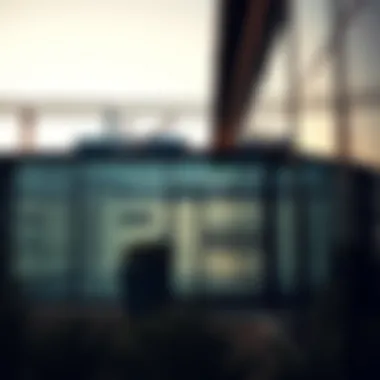
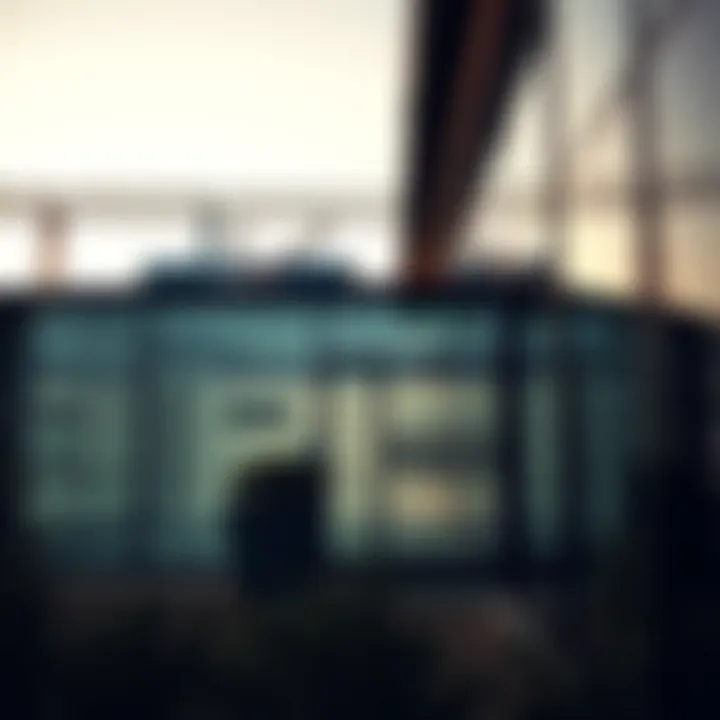
Energy Efficiency
Beyond aesthetics and structural integrity, industrial glass also plays a crucial role in energy efficiency—a major consideration in today’s real estate market. Low-E glass, for instance, is designed to minimize heat transfer, which can significantly reduce cooling costs in the sweltering Dubai heat, making it an ideal choice for residential and commercial properties.
Incorporating energy-efficient glass helps to ensure that buildings adhere to local sustainability guidelines, which is becoming increasingly important as Dubai strives to be a green city. Investors should note that properties equipped with energy-efficient features attract eco-conscious tenants and buyers, leading to enhanced marketability and potentially higher returns on investment.
"Investing in properties that utilize advanced glass technology not only aligns with sustainability efforts but also promises better performance in the long run."
Types of Industrial Glass
Understanding the types of industrial glass is crucial for anyone involved in Dubai's dynamic real estate market. Each type offers unique benefits and characteristics that cater to different applications, ensuring that investors, agents, and buyers can make informed decisions. The diversity of industrial glass can enhance functionality, energy efficiency, and aesthetic appeal in buildings. Let's delve into some of the most significant types of industrial glass utilized in Dubai:
Tempered Glass
Tempered glass, also known as toughened glass, undergoes a special thermal process that increases its strength compared to standard glass. This process involves heating the glass to very high temperatures and then rapidly cooling it.
- Strength and Safety: Its enhanced durability makes it a popular choice for high-rise buildings and facades. The glass is designed to shatter into small, blunt pieces upon breaking, minimizing injury risk.
- Applications: Commonly used in facades, doors, and windows, it can handle temperature fluctuations and impact, making it perfect for Dubai's hot climate.
Laminated Glass
Laminated glass consists of two or more glass layers bonded together with an interlayer, usually made of polyvinyl butyral (PVB). This sandwiched construction provides numerous advantages.
- Sound Insulation: A great option for noise-sensitive areas, it dampens sound significantly, contributing to a more comfortable living or working environment in the bustling city.
- Security: It adds an extra layer of security due to its resistance to breakage, deterring unwanted intruders. Hotels and upscale offices in Dubai often use laminated glass for their facades and partitions.
Insulated Glass
Insulated glass units (IGUs) typically consist of two or more panes separated by a gas-filled space, improving thermal performance significantly.
- Energy Efficiency: In hot climates like Dubai, insulated glass helps maintain cooler indoor temperatures, leading to reduced energy consumption for cooling systems. This aspect can be particularly appealing to environmentally conscious developers and investors.
- Condensation Control: The design helps prevent condensation from building up between the panes, which can protect a property’s overall integrity.
Low-E Glass
Low-emissivity (Low-E) glass features a special coating that reflects heat while allowing sunlight to enter. This balance is vital for energy efficiency.
- Energy Savings: Buildings equipped with Low-E glass can achieve significant savings on energy bills while providing ample natural light. This type of glass is particularly advantageous for properties aiming for green building standards.
- UV Protection: It also helps block harmful ultraviolet rays that can fade furnishings and art, proving beneficial for both residential and commercial spaces in Dubai.
Market Dynamics of Industrial Glass in Dubai
Understanding the market dynamics of industrial glass in Dubai is crucial for various stakeholders including investors, buyers, and even analysts who keep a finger on the pulse of the industry. This section delves deep into the forces that define this dynamic market, highlighting how demand and supply factors, key players, and the competitive landscape shape opportunities and challenges within the sector.
This exploration will outline not just the numbers, but the very fabric of the environmental, economic, and regulatory considerations that underline the industrial glass market in the Dubai area.
Demand and Supply Factors
The demand for industrial glass in Dubai is linked closely to the growth of its construction and real estate sectors. With ongoing projects that aim for record-breaking heights and innovative designs, the need for high-performance glass solutions is palpable. Factors driving demand include:
- Urban Expansion: Dubai's relentless push towards expansion necessitates a variety of glass solutions to fit diverse architectural styles.
- Sustainability Trends: A simple fact is that green building practices are more than just a passing trend. Many new constructions now incorporate energy-efficient glass, which in turn drives up demand for specific types of industrial glass.
- Regulatory Influence: Government regulations that favor energy-saving materials promote the use of low-E glass and other specialized industrial glass products.
- Cultural Shift: Consumers and businesses alike in Dubai increasingly consider aesthetics and practicality, influencing architects and builders to seek innovative glass solutions.
Conversely, supply factors also play an integral role. Supply chain disruptions, often influenced by global economic shifts or regional conflicts, can directly impact availability. Moreover, the production capacity of local glass manufacturers, logistical considerations, and import tariffs can fluctuate demand.
Key Players in the Market
When we talk about the industrial glass market in Dubai, a few names repeatedly surface. These key players primarily consist of established manufacturers and innovative newcomers eager to capture their segment of the market.
Notable companies in the Dubai industrial glass scene include:
- FlyingColors: Renowned for their high-impact glass products, catering specially to the region's skyscraper dynamics.
- AGC Glass Europe: Known for a wide array of glass solutions, AGC leverages cutting-edge technology in glass production.
- Jumbo Glass: This manufacturer focuses on custom solutions to meet the diverse needs of the architectural sector in Dubai.
These companies not only bring products to the table, but are also heavily involved in research and development, pushing the envelope in glass technology.
Competitive Landscape
The competitive landscape of the industrial glass market in Dubai is as vibrant as it is complex. As the demand continues to lift, competitors are pacing to stay ahead, using a mix of strategies that highlight product innovation, pricing, and customer relationship management.
- Product Differentiation: Companies often invest in unique features, such as tempered, laminated, and insulated glass, to cater to a niche market.
- Pricing Strategies: Many players adjust their pricing in response to market conditions, ensuring they can maintain or enhance market share without compromising on the quality of their products.
- Distribution Channels: Customizing distribution channels to better reach builders, architects, and contractors has become essential.
"The industrial glass sector in Dubai reflects a microcosm of the larger, evolving construction ecosystem, where evolution is constant and competition is fierce."
To stay relevant, established manufacturers are constantly updating their offerings, while new entrants seek innovative solutions that can distinguish their products. Such dynamics ensure that the market remains fluid and full of opportunities for those who want to invest wisely. Understanding these market dynamics is necessary as they provide a clear view of where to place investments, how to anticipate changes, and what partnerships may yield beneficial results.
By grappling with the intricacies of these market forces, stakeholders can navigate the complexities of investing and engaging with the industrial glass sector in Dubai.
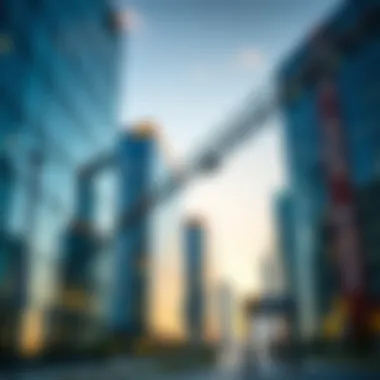
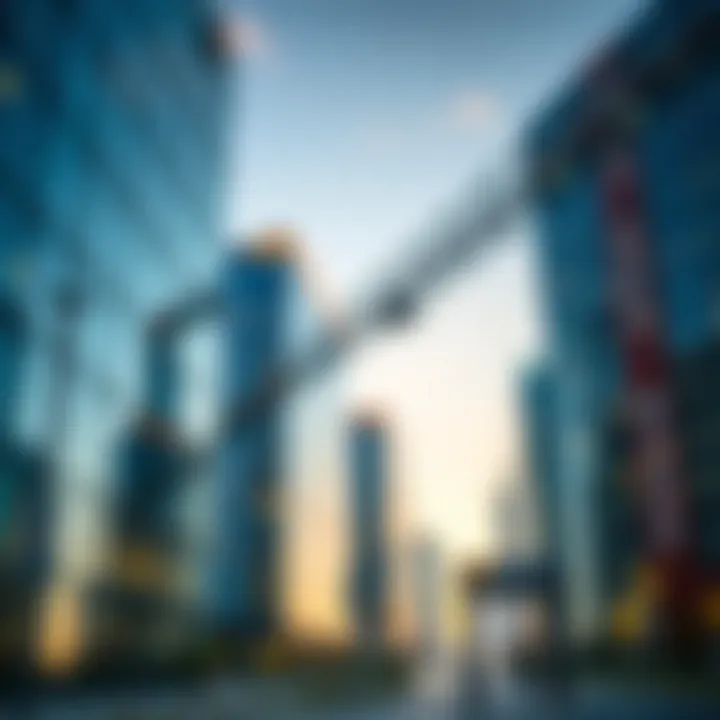
Investment Opportunities in Industrial Glass
The landscape of industrial glass in Dubai is rich with investment prospects. Investors looking to broaden their portfolios need to zero in on this sector as it carries significant potential. The booming construction industry and rising demand for glass in various applications mean that the right investments can yield major returns. Furthermore, as global norms increasingly prioritize sustainable practices, industrial glass—crafted to meet both aesthetic and functional requirements—is undeniably gaining traction.
Emerging Trends
In the realm of industrial glass, innovation is the name of the game.
- Smart Glass: This technology, capable of changing its properties in response to environmental conditions, is on the rise. Its utility in energy-efficient buildings makes it a hotbed for investments. As more developers seek to integrate smart technology into their projects, the demand for smart glass is expected to soar.
- Recycling and Sustainability: Increasingly, the focus on recycled glass is steering investment towards more sustainable manufacturing practices. Many new players in the market are adopting recycled materials to meet the growing demand for eco-friendly building supplies.
- Customization: Tailored solutions for specific architectural styles and structural needs are becoming a significant trend. Investors should note how companies are leveraging technology to create bespoke glass products that fulfill unique design requirements.
"In today’s market, the ability to offer customized solutions can be a game-changer for businesses in the glass industry."
Government Incentives
The regulatory environment in Dubai actively promotes investment in the industrial glass sector. A variety of government incentives can assist investors in achieving their goals, including:
- Subsidies for Eco-Friendly Projects: The Dubai government is pushing towards sustainability. They offer financial incentives for projects that incorporate sustainable building materials, including advanced industrial glass solutions.
- Tax Benefits: New businesses within certain zones may benefit from reduced taxation rates, encouraging foreign investment. These financial advantages can significantly enhance the bottom line for investors venturing into the glass sector.
- Support from Economic Development Authorities: Entities like the Dubai Department of Economic Development provide resources and support to guide investors through the complexities of entry into the industrial glass market.
Potential Returns
Investing in industrial glass isn't just about using materials; it’s about tapping into a market that offers promising returns.
- Long-term Growth: As Dubai continues to develop and modernize, the demand for industrial glass is poised for long-term growth. Projects like the Expo 2020 site have already proven that there’s an ongoing need for high-quality glass installations.
- Market Diversification: The versatility of industrial glass means it’s utilized in various sectors like architecture, automotive, and manufacturing. An increasing interest in art installations using glass also diversifies market opportunities, making it a wise choice for forward-thinking investors.
- High Demand in Emerging Markets: The demand for glass in developing areas around Dubai is set to escalate, opening doors for investors ready to tap into these new markets.
Ultimately, those with a keen eye for trends and opportunities within the industrial glass sector in Dubai are likely to find themselves in a favorable position in the coming years.
Technological Advancements in Industrial Glass Production
The domain of industrial glass is undergoing rapid transformation due to technological innovations that not only enhance production efficiency but also open new avenues for application and sustainability. These advancements are paramount for a thriving market like Dubai, where the juxtaposition of modernity and tradition catalyzes creativity in construction and design. With an ever-growing demand for unique architectural elements, the importance of these tech advancements cannot be overstated.
Innovative Manufacturing Techniques
In recent years, manufacturing techniques have seen a significant overhaul aimed at producing glass that is not just functional but also tailored to diverse needs. For instance, robotic automation has been making its mark. Robotics allow for precise cutting, shaping, and handling of glass which substantially reduces waste and increases product quality. Furthermore, advancements in material science have led to the development of new glass variants, such as photonic glass that modifies light, paving the way for dynamic aesthetics in architectural designs.
- Glass Fusing and Casting: These methods are gaining traction for their ability to combine multiple glass types, creating unique facets in design.
- 3D Printing of Glass: This is a game changer. It allows for the crafting of complex shapes that were previously impossible, reshaping the landscape of interior design.
New Applications of Glass
Technological progress has not just changed how we make glass but also how we use it. Modern glass finds its place in various sectors, expanding beyond traditional boundaries. One of the standout applications is smart glass, which can adjust its transparency based on the light intensity, enhancing privacy and energy efficiency at the same time. In the realm of healthcare, anti-bacterial glass coatings are gaining popularity, providing safer environments.
Other noteworthy applications include:
- Architectural Glazing: Functional showcases that tie aesthetics with energy conservation.
- Solar Glass Technologies: Glass that can capture sunlight to enhance energy production in buildings.
Sustainability in Production
Sustainability, an ever-pressing issue, deeply influences industrial glass production. With the world increasingly leaning toward greener practices, factories are exploring methods to minimize their ecological footprints. Innovations such as recycled glass use in the manufacturing process have emerged as viable options, reducing raw material consumption. Technologies enabling energy-efficient production processes are also becoming standard, which not only lowers operational costs but diminishes carbon emissions.
A few important points to consider include:
- Reduction of Wastes: Incorporating lean manufacturing principles to minimize excess.
- Use of Renewable Energy: Employing solar panels or wind energy on-site can drastically cut down on fossil fuel usage.
Ultimately, technological advancements in industrial glass production offer benefits that resonate well with Dubai’s vision of sustainable development and innovation in the real estate sector. For potential investors and stakeholders, staying abreast of these changes can be the difference between leading the market and playing catch-up.
Regulatory Environment Affecting Industrial Glass
The regulatory landscape significantly impacts the industrial glass sector in Dubai, serving as a foundation that influences everything from production standards to market entry. Regulations not only dictate how safely and efficiently glass products can be manufactured but also ensure that they meet specific quality and sustainability benchmarks appropriate for a rapidly evolving market. In Dubai's context, where real estate development is booming, understanding the regulatory framework becomes vital for investors and businesses aiming to capitalize on opportunities in the industrial glass sector.
Local Regulations
Local regulations specify the guidelines and protocols that manufacturers and distributors of industrial glass must adhere to within Dubai. The government aims to ensure product safety, structural integrity, and environmental protection through these directives.
One major legislative document is the Dubai Building Code, which outlines the necessary standards for construction materials, including glass. Failure to comply with these regulations can result in hefty penalties and, in worst-case scenarios, project shutdowns. It's not just about following rules; it also brings benefits like improved product marketability and enhanced consumer trust.
ul> li>Building Codes: Compliance with building codes ensures that installations are safe and reliable.li> li>Safety Standards: Local safety standards dictate minimum thresholds for durability and performance in glass products.li> li>Permit Processes: Understanding the required permits can expedite project completion timelines.li> ul>
For instance, some local regulations require that tempered glass is used in specific applications like balcony railings or storefronts. Thus, local regulations are not just bureaucratic roadblocks; they shape the quality and efficacy of the end products, as well as the safety of the end-users.
International Standards
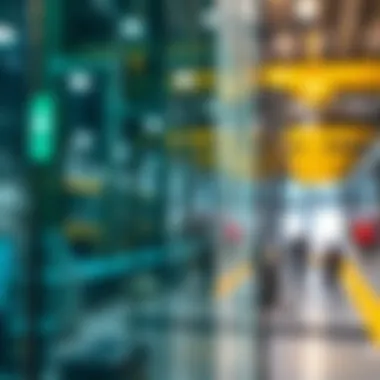
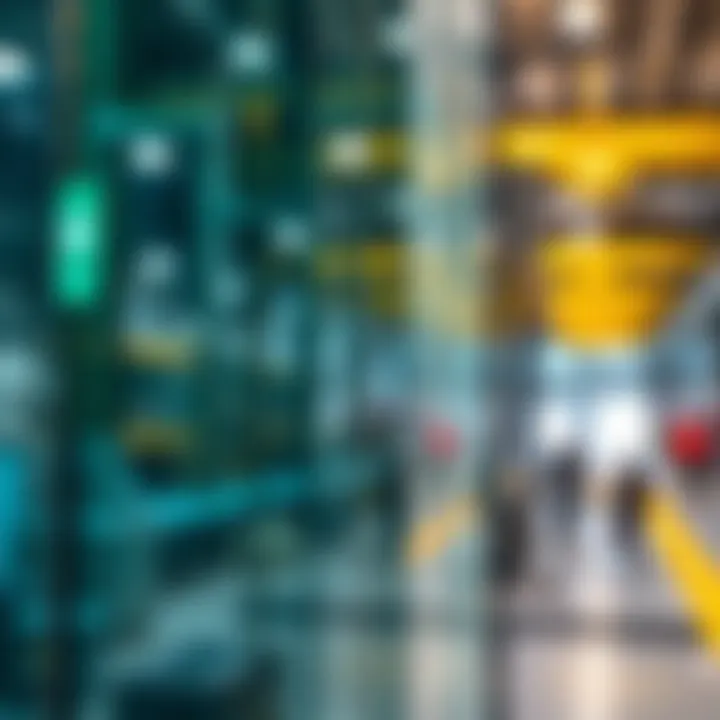
While local regulations are essential, they often stem from or align with international standards that ensure uniformity in quality and safety across borders. International standards come into play especially for companies focusing on exporting their products or engaging with global partners.
Important entities like the International Organization for Standardization (ISO) provide a framework that governs various aspects related to industrial glass. Compliance with these standards can open doors to new markets and allow businesses to engage in international projects without a hitch.
Not adhering to international standards not only limits market access but can also tarnish a brand's reputation.
The following are some key international standards applicable to the industrial glass industry:
- ISO 12543 - Laminated glass and laminated safety glass.
- ISO 614 - Glass in Building standards that govern performance and safety.
- EN 12150 - Safety glass in buildings, defining performance characteristics.
By adhering to international standards, companies not only safeguard their products and clients but also position themselves faorably to compete on a global scale. This kind of compliance sends a strong message to the market indicating that a business is committed to the highest quality and safety levels.
Challenges Facing the Industrial Glass Industry
The industrial glass sector in Dubai is not without its hurdles. Understanding these challenges is crucial for investors, buyers, and industry professionals looking to navigate this intricate landscape. Various factors can impact the production, distribution, and consumption of industrial glass, thus affecting both the market dynamics and potential returns in this burgeoning field.
Supply Chain Issues
Supply chain disruptions are one of the most pressing challenges facing the industrial glass industry today. The complexity of sourcing raw materials, coupled with dependence on global production, can lead to delays and inflated costs. For instance, as the demand for sustainable materials increases, manufacturers might struggle to find suppliers who adhere to stringent environmental guidelines.
In recent years, the COVID-19 pandemic highlighted the vulnerability of global supply chains. For example, factories shutting down in one region can have a cascading effect elsewhere. This has spurred companies to rethink their sourcing strategies and consider local alternatives, although such shifts require time and investment.
Market Competition
The competitive landscape in Dubai's industrial glass sector is fierce. A myriad of local and international players vying for market share adds pressure on pricing and innovation. Companies must differentiate themselves to stand out. This means investing not only in advanced technologies but also in marketing strategies that resonate with consumers.
For instance, firms that provide superior customer service or focus on niche markets, such as energy-efficient glass products, can carve out a sustainable position. However, the challenge lies in balancing quality and affordability while keeping a keen eye on competitors who may attempt to undercut prices. Staying ahead of trends is essential for survival in such a saturated market.
Changing Consumer Preferences
As the real estate market evolves, so too do the preferences of its consumers. Today's buyers are more informed and have specific expectations regarding aesthetics, functionality, and sustainability. This shift poses a significant challenge for producers of industrial glass.
Consumers now frequently seek out products that not only look good but are also eco-friendly and energy-efficient. The rise of green building certifications has underscored this trend, compelling manufacturers to adapt their offerings. Failing to meet these demands could result in lost opportunities, as buyers gravitate towards brands that align with their values.
"In the fast-paced world of construction and design, the choices made today can sculpt the skyline of tomorrow"
In summary, the challenges facing the industrial glass industry in Dubai are multifaceted, encompassing supply chain vulnerabilities, intense market competition, and shifting consumer preferences. Investors and stakeholders who remain aware of these dynamics will be better positioned to make informed decisions.
Future Outlook for Industrial Glass in Dubai
As the Dubai real estate market continues to evolve, the future outlook for industrial glass is both dynamic and promising. This segment of the market is driven by several pivotal elements that include changing architectural trends, the push for sustainability, and growing demand for energy-efficient solutions. Understanding the future landscape of industrial glass is essential for investors, developers, and stakeholders aiming to navigate this specialized industry.
The emphasis on industrial glass is also aligned with broader global movements, where cities adopt greener building practices. Dubai, known for its ambitious skyline, is at the forefront of innovation. The need for high-performance glass products hinges on balancing aesthetics with functionality. This balance not only enhances the visual appeal of structures but also contributes to significant energy savings and environmental sustainability.
Growth Projections
Looking ahead, the growth projections for industrial glass in Dubai appear robust, fueled by an increasing number of construction projects and infrastructure developments. According to industry analysts, the market for industrial glass could experience an annual growth rate of 8% to 10% over the next five years. This uptick can be attributed to a variety of factors:
- Infrastructure Expansion: Major projects like the Dubai Expo 2020 legacy developments and various mega real estate initiatives are expected to create heightened demand.
- Architectural Innovation: As architects push the envelope in design, they are turning to advanced glass solutions that offer superior strength and insulation, driving up usage.
- Regulatory Incentives: Local regulations that promote energy conservation contribute to increased adoption of glass products that enhance building performance.
"Sustainable building practices are no longer just a trend; they have become a necessity for urban development, particularly in a city as progressive as Dubai."
Investors and industry professionals looking to benefit from these projections should pay attention to market segments such as tempered and insulated glass, which are anticipated to see significant uptake in various applications.
Impact of Global Trends
The influence of global trends on the industrial glass market in Dubai cannot be underestimated. As the world grapples with climate change and seeks energy efficiency, the role of industrial glass has expanded beyond that of a mere building material.
Key Global Trends Influencing Local Market:
- Sustainability Initiatives: The growing emphasis on sustainable development has led to a surge in demand for eco-friendly building materials. Industrial glass, particularly those with low-emissivity (Low-E) coatings, makes it possible for structures to achieve better energy efficiency.
- Smart Glass Innovations: The rise of smart glass technology, which allows for enhanced control over light and heat, is being integrated into more construction projects across Dubai. This adaptability aligns well with the global move towards digital solutions in architecture.
- Economic Diversification: As the UAE diversifies its economy, sectors such as tourism and hospitality continue to thrive, driving the need for premium construction materials. Industrial glass plays a significant role in delivering high-quality, aesthetically pleasing buildings that attract investment.
Ending
In this article, we have traversed through the myriad layers of the industrial glass sector within Dubai’s expansive real estate landscape. The significance of industrial glass cannot be overstated, as it plays a pivotal role not just structurally but also aesthetically. With a growing demand stemming from technological advancements, the relevance of this material is ever-so-present in a city renowned for its architectural audacity.
The benefits of investing in industrial glass are substantive. It offers a blend of safety, energy efficiency, and modern aesthetic appeal, which directly aligns with the heightened expectations of property buyers and stakeholders. As the market dynamics evolve, so too do the investment potentials, driven by global trends and local demand surges.
There are critical considerations for investors. Understanding local regulations and their impact on production and installation ensures smooth operations. Likewise, the challenges—be it supply chain disruptions or shifting consumer preferences—warrant careful navigation.
Looking to the future, Dubai’s industrial glass market is ripe for exploration. Growth projections indicate robust expansion, reflecting not just on local practices but also taking cues from international benchmarks. In light of emerging trends and sustainability considerations, this sector remains an attractive venue for savvy investors.
In summary, the insights gathered here aim to guide of all stakeholders — be it investors, agents, or analysts — by vividly summarizing both opportunities and necessaries in the realm of industrial glass. Elevating this material from mere functional use to a cornerstone of contemporary architecture, investors would do well to position themselves critically in this evolving landscape.
"Understanding how glass is playing a transformative role in Dubai’s architectural identity is vital for those looking to invest or operate in the space."
By synthesizing the information presented throughout this piece, readers should now have a clearer picture of industrial glass's implications and potential in shaping not just buildings, but an entire era of real estate in Dubai.


